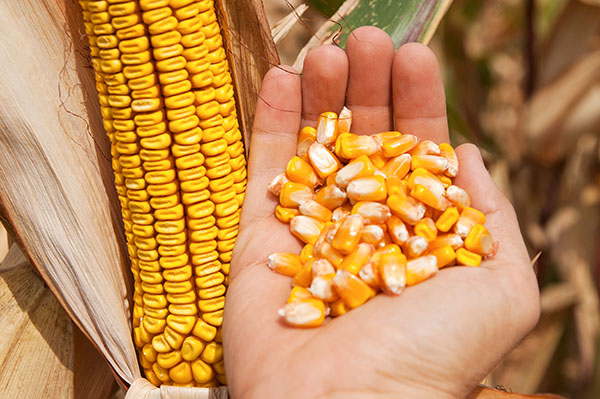The myths and misconceptions regarding seed oils seem to be growing every day at this point. These are some of the most prevalent unsubstantiated claims that continue to circulate on social media despite Food Science Babe and many other science communicators’ best efforts to share science-based information time and time again.
Read MoreHave questions about meat production and the care of animals? Want to help protect livestock production? Check out the Animal Agriculture Alliance.
Read MoreHow do genetically modified crops affect the environment? TeachKyAg went to GMOanswers.com, a resource widely supported by its partners, to answer this question.
Read MoreAs Barry Alexander drives a tractor across a soybean field on Cundiff Farms, his eyes are on a computer screen that shows his precise location, the speed of the tractor, exactly how much seed is being planted per acre and more. He can watch the screen closely because the tractor uses autosteer to move across the field in a straight line.
Read MoreGene editing is a technology that’s making headlines for the variety of ways it can be used to improve food and benefit the environment. This is an especially exciting time as scientists are seeing their research applied in the field, leading to food that is healthier, better quality and more sustainably produced.
Read MoreDairy farmers strive every day to produce wholesome milk and milk products that your family can feel good about eating. The U.S. Department of Agriculture (USDA) and Food and Drug Administration (FDA) regulate U.S. milk production, and its guidelines are some of the strictest in the industrialized world. Farmers, processors and government agencies all work together to ensure the milk you drink is safe and of the highest quality.
Read MoreThe beef community has a long-standing commitment to caring for their animals and providing families with the safest, highest-quality beef possible. Beef Quality Assurance (BQA) is a program that trains farmers and ranchers on best practice cattle management techniques to ensure their animals and the environment are cared for within a standard set of guidelines across the U.S. beef industry.
Read MoreTo gain some insight into the difference between pesticide-free and organic, Best Food Facts reached out to Dr. Paul Vincelli, Extension Professor and Provost’s Distinguished Service Professor, University of Kentucky.
Read MoreSafe food begins with healthy animals and quality care. Animal well-being is our ethical responsibility and it’s a top focus every day on the farm.
Read MoreThere has been much attention on how animal agriculture affects the environment, and many in high places are encouraging meat-outs and drastic changes to food production methods. But the agriculture industry is constantly evolving.
Read MoreProtein comes in many forms, with plant-based options now widely available. Some people choose meat for the flavor, texture or nutrition profile, while others are interested in alternatives.
Read MoreEarlier this month, a subcommittee of the U.S. House of Representatives Committee on Oversight and Reform released a staff report that confirmed several baby food companies had knowingly used food ingredients that contained “high” levels of toxic heavy metals in their products.
Read MoreDr. Debbie Reed is the Director of Breathitt Veterinary Center. In this position, she ensures that the most modern equipment and best staff are on hand to diagnose animal diseases.
Read MoreMention GMOs – genetically modified organisms – and you’ll likely hear a wide range of opinions. Some believe these plants and animals have great benefits to produce food and protect the environment. Others believe they hold potential risks and should be avoided. GMOs have been in use for many years. Despite the broad scientific consensus that they are safe to eat and safe for the environment, their use has generated plenty of public dialogue, questions and curiosity about the technology.
Read More“I love seeing how food is made,” remarked Tina. “This is real life. I typically visit two facilities a week and they are all different. In the past month, I have visited a mining operation that provides minerals for animal feed, a dairy operation that makes dairy beverages, fruit juices and ice cream , a pepper sauce plant, and facilities that make fig bars and fish oil.”
Read MoreThe Food and Drug Administration (FDA) recently released a report summarizing the sales of medically important antibiotics for agricultural use in 2018. There was a 21 percent decrease in sales from 2009, the first year of reported sales. The decline is even more significant when compared with 2015 – a 38 percent decrease according to the FDA report.
Read MoreThis is the second article in our series on what influences food choices. In September we addressed sustainability. This month we are going to tackle animal welfare issues, specifically confinement.
Read MoreKentucky’s meat industry - like all others - have been profoundly impacted by the COVID-19 pandemic, a crisis that has heightened the anxieties of meat producers, sellers and consumers while also reminding them what they loved about meat in the first place.
Read MoreMr. Warren Beeler discusses how Kentucky farmers are more sustainable than ever.
Read MoreJames R. “Buddy” Smith has been farming in the Bluegrass Region for more than 50 years. He is the 2020 Kentucky Leopold Conservation Award winner.
Read More



















